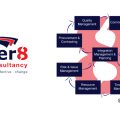The 7 don’ts of project management
Every project offers its own complexities. These could be multiple phases taking many years, working with large teams from various technical disciplines, backgrounds, locations, and even different time zones. All these mean successful project management and being an efficient project manager, needs organisation, forward thinking and of course, sometimes relying on your gut instinct.
At Acceler8 we take project management seriously. So, to help make sure your project is a success, we’ve identified our team’s top 7 don’ts of project management.
Don’t forget to set goals upfront
To ensure you meet your end goal, you and your team need to understand what’s expected of you . Peter Drucker, the Austrian-born American management consultant and author, famously said, “Plans are only good intentions unless they immediately degenerate into hard work.” So, set your expectations from the outset, clearly define roles, responsibilities, and more importantly time frames. This allows your team to manage their own time effectively and work together efficiently.
Don’t forget to break large projects into phases
Any large project, where possible, needs to be broken down into different phases. Because small, manageable pieces make teams feel more comfortable and confident about successfully tackling what may seem like an impossible project. And accomplishing each mini milestone will motivate them for subsequent phases.
Don’t forget to prioritise your tasks
How do you determine what is a priority and what’s not? As project lead, you need to understand the processes that will take place to achieve your goals. Within these processes, different elements will link together and run like a domino effect. If there are any broken links and one part of the process hasn’t been completed, you’ll find yourself going back a few stages.
Don’t forget project management is also people management
It can be easy for project managers to get bogged down in a project’s scope, quality, cost and timeline. It can mean they forget about the people who are doing the work. Failing to properly manage individuals or on the flip side, micromanaging them, can lead to delays, for instance. It can also impact quality and result in additional costs to the overall project.
Don’t let communication slip
Avoid this problem by going back to tip one. Ensure everyone understands how and why their role is important to the success of the project. And schedule time for regular updates. Create a communications strategy which includes sponsors, team members, executives, suppliers and other stakeholders. As a result, those involved will understand progress and share the same vision.
Remember good communication is key within any business.
Don’t forget project management is also stakeholder management
It is easy to think that just doing communications will keep stakeholders onside. However, the reality is a project manager needs to build trusting working relations with stakeholders. This is the golden rule of project management. That’s because it gives the project manager the ability to prioritise more effectively and contain issues as they emerge.
Don’t be surprised if your plans change along the way
According to Winston Churchill, “Those who plan do better than those who do not plan, even though they rarely stick to their plan.”
It’s likely that your plans will change along the way. Let’s face it, Churchill’s did. But, at least he had a plan and the people around him understood their objectives.
Adding these simple tips into one project management strategic plan will help you achieve your goals to deliver your project.
To learn more contact us at enquiries@acceler8consultancy.com







